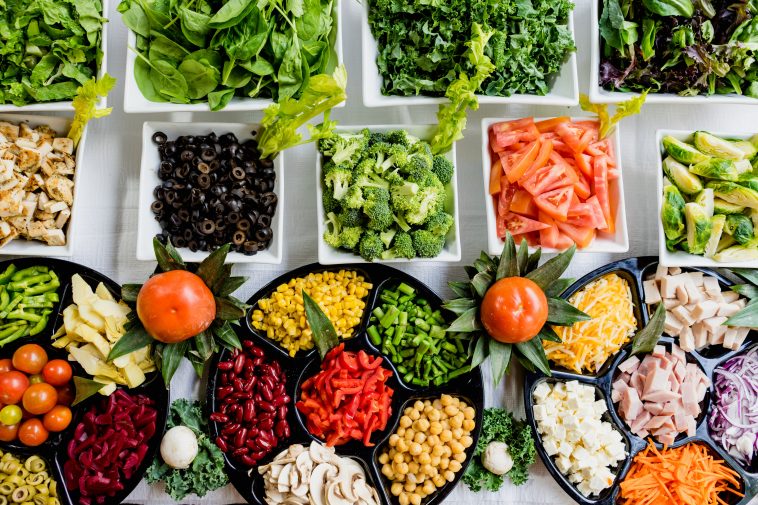The popularity of plant-based diets has sky-rocketed in recent years as more people become aware of the numerous health benefits they provide. Although plant-based diets have grown in popularity, many people still regard them as a foreign and hazy concept due to a lack of information on the subject.
According to a 2018 study by Dalhousie University, about 2.3 million Canadians (or 6.4% of the population) followed a plant-based diet. The study also found that one-third of Canadians were reducing their meat consumption, and that trend was particularly more common among the younger generation. Another study from Nourish Food Marketing found that between 2013 and 2018 there was a 250% increase in Canadian restaurants offering vegan and plant-based options on their menus.
Major fast food chains such as A&W, Tim Hortons, and McDonald’s now offer plant-based burgers and breakfast sandwiches, and many grocery stores have dedicated vegan and vegetarian sections. Several innovative plant-based food startups have also emerged, with entrepreneurs realizing the enormous potential in this untapped market. This suggests that plant-based diets are becoming more mainstream and accessible in Canada.
Famous personalities who follow plant-based diets include people from all walks of life, to name a few: Serena Williams, Ellen DeGeneres, Novak Djokvic, Ariana Grande, Natalie Portman, Liam Hemsworth, and others (the list goes on and on)
Tim Shieff even went a step further and said, “Nothing has benefited me more physically, mentally and most important spiritually, then adapting a vegan diet. The best decision I have made as a human for me and the planet.”
Before delving into the various complexities of a plant-based diet, it is necessary to define what a plant-based diet is.
What is a Plant-Based Diet?
It is important to note that different people may interpret a plant-based diet differently, that a plant-based diet may mean different things to different people, and that there is no one-size-fits-all definition.
A plant-based diet, in general, is one that focuses on whole, minimally processed plant foods like fruits, vegetables, whole grains, legumes, nuts, and seeds while limiting or eliminating animal products like meat, dairy, and eggs.
However, how much people limit animal products in their plant-based diet varies.
Some people may choose to follow a completely vegan diet, which excludes all animal products, whereas others may include small amounts of animal products, such as fish or eggs, in their plant-based diet. The terms “vegan” and “plant-based” are often used interchangeably, but there is one key difference that separates the two.
The former is a vegetarian diet that excludes all animal products such as meat, eggs, dairy, and so on, as well as products derived from animals such as gelatin or casein. Whereas, the latter may or may not exclude animal products or products derived from animals. In summary, All vegans follow a plant-based diet, but not all people who follow a plant-based diet are vegans.
The Advantages of a Plant-Based Diet
Improves Digestion
Plant-based diets benefit the body’s digestive system because they are high in fibre, which promotes regular bowel movements and prevent gastrointestinal diseases such as constipation, Irritable Bowel Syndrome (IBS), anal fissures, internal and external hemorrhoids, and so on.
Reduced risk of chronic diseases
Plant-based diets are high in nutrients, vitamins, and minerals, as well as phytochemicals (which have anti-inflammatory and anti-cancer properties), proteins, antioxidants and healthy fats. Numerous studies have found that plant-based foods can help reduce chronic diseases such as cancer, diabetes, and heart disease.
Plant-based foods have also been shown to aid in weight management and lower the risk of obesity, which is one of the primary causes of chronic disease in the first place.
Concerns of Animal Welfare
Concerns have been raised about the meat industry’s transparency regarding the terrible conditions in which the animals are raised, the inhumane manner in which the animals are slaughtered, and the various types of anti-biotics fed to the animals to enhance their flavor and taste.
Although plant-based diets do not entirely discourage the consumption of meat, they can significantly reduce it.
Environmental Consideration
Plant-based agriculture, as opposed to animal agriculture, does not necessitate extensive use of limited resources such as land, water, and so on, and thus has a positive impact on the environment by reducing the production of greenhouse gases and other pollutants that harm the environment.

How can you Incorporate more Plant-Based Foods into your Diet?
Start small
Developing the habit of incorporating plant-based food into your diet is similar to developing any other habit; start small, with one plant-based meal per week, and gradually increase the frequency as you become more comfortable.
If you think that even one plant-based meal will be too much for you, you can start with one plant-based item per week. The goal of this exercise is to get started, even if it is in small steps.
Make a meal plan
Meal planning will not only ensure that you have enough plant-based food in your meals, but it will also help you make a grocery list so you know you haven’t forgotten any important ingredients.
You have the option of writing down your grocery list and meal plan on paper or keeping it digitally. It has been scientifically proven that you are more likely to stick to written goals than to goals that you have in your head or have not written down.
Connect with a community
Connect with a community of fellow plant-based food consumers, whether through social media platforms like Instagram and Facebook, online forums, or in-person.
This would not only keep you motivated to stick to your goal of eating plant-based food, but it would also keep you up to date on any new developments such as new recipes, new plant-based products, and so on. If you become discouraged in your quest to incorporate more plant-based foods into your diet, you can always seek help from your community.
Shop at a Local Famer’s Market
You can begin shopping at a local farmers market rather than a supermarket because the former allows you to buy fresh, locally produced goods in the city.
You would also be able to speak with the farmer about the various plant-based options that you are looking for and benefit from his extensive knowledge of food products. It would also vastly improve your knowledge about the available plant-based options and food as a whole.
Research & Experiment
People frequently believe that plant-based meals are limited in variety and low in important nutrients, however, this is not the case because there are numerous plant-based options, the majority of which are also high in nutrients.
As a result, it is critical to conduct ongoing research on the various plant-based options and their nutritional content. It’s also important to keep experimenting with new plant-based recipes because this will help you figure out what works best for you. To develop the long-term habit of including plant-based foods in your diet, ongoing research and experimentation are essential.
Look for readily accessible alternatives
The sudden increase in the number of people turning to plant-based options has compelled supermarkets and other grocery stores to make plant-based alternatives readily available to customers.
As a result, you should try to find easily accessible alternatives for your favourite food items, which will not only satisfy your craving for your favourite food but will also aid in your transition to a plant-based eater. For example, instead of consuming pepperoni, utilize plant-based pepperoni, and in place of dairy cheese, utilize dairy-free cheese.
Conclusion
To summarize, transitioning to a plant-based diet can not only provide numerous health benefits such as lowering the risk of chronic diseases, improving digestion, building immunity, and improving overall body well-being, but it can also be more environmentally friendly by lowering greenhouse gas emissions and conserving precious resources such as water.
You can begin your plant-based eating journey by experimenting with new recipes, joining a plant-based eating community, planning your meals ahead of time, or shopping at your local store. The transition to a plant-based diet will be difficult, and it may seem insurmountable at first, but remember that it will get easier over time.
The key is to develop good habits, stick to them, and take things one day at a time. Transitioning to a plant-based diet is a journey, not a destination; keep this in mind as you take your time and, most importantly, enjoy the journey.
Plant-based eating will become a more natural and enjoyable part of your life over time. Making conscious food choices can have a positive impact on both your health and the environment. So, why not try plant-based eating? Your body and the environment will both thank you.



GIPHY App Key not set. Please check settings